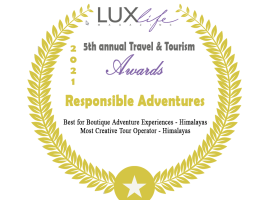Important facts about Bhutan
It is not a surprise that very few people know minimal facts about Bhutan. Even the most experienced travellers will probably be unsure where the location of Bhutan. Bhutan’s government has deliberately remained closed to protect their ancient traditions even though government-approved tours are possible. Despite being a developing nation, the number of tourists entering the country is controlled by high costs. The government has set a high season cost of US$250 per person per day, and this is to discourage mass tourism, which could influence their youths away from their traditions. Bhutan has been off the backpackers’ list because of the high cost.

Where Is Bhutan?
Bhutan is in the Eastern Himalayas and is a small nation sandwiched between India and Tibet. It is east of Nepal and north of Bangladesh. It is a member country of the South Asian Association for Regional Corporation (SAARC).
Facts About Bhutan
- With 38,359 square kilometres of territory, Bhutan is slightly larger than Taiwan and a little smaller than Switzerland. Most of the country consists of Hilly and mountainous terrain.
- Druk Yul is the local name for Bhutan. It means “Land of the Thunder Dragon.” The dragon is on the flag of Bhutan.
- To modernise Bhutan, the past King finally permitted television and internet access into the country only in 1999. Bhutan is among the last nations in the world to allow TV. Some television channels are received from their giant neighbour, India. The past king issued warnings that abuse of television could corrupt their traditional lifestyle.
- Citizens must wear national dress. The men wear traditional, knee-length garments called “Gho,” and the women wear ankle-length dresses with a silk or brocade blouse called “Kira.” The colours can indicate someone’s status and social class.
- Bhutan was the first nation to ban the production and sales of tobacco products in 2010. Although it is illegal to smoke in public areas, tobacco products can be used in private. The first King of Bhutan called tobacco the “worst herb” as early as 1916. The violators are slapped with a hefty fine, as much as two months’ average salary.
- Bhutan is the pioneering nation in creating the measurement of national happiness officially. The index is called Gross National Happiness (GNH). The government has emphasised GNH, prioritising GDP over the rest of the world. This Himalayan nation intends to track the happiness of the population. The United Nations adopted this idea and released a World Happiness report in 2012.
- Before the focus on internal happiness started, the Bhutanese government was accused of human rights violations against ethnic minorities living there, especially those of Nepalese origin. As a result, 100,000 were forced out of the country or into refugee camps. The United States has accepted more than 95,000 Bhutanese refugees since 2008.
- The Bhutanese government provides free education. Buddhist teachings are highly prioritised. English is a widely taught second language in its education system. Only 30 per cent of the male and 10% of the female population were literate before the education reform was passed in the 1990s.
- Bhutan is unique, where the inheritance of land, house, and animals is passed on to the eldest daughter rather than the son or sons, like in most Asian cultures. The husband often moves into his new wife’s home until he becomes financially independent.
- The Bhutanese were discouraged from marrying foreigners. The law forbids homosexuality. Although polygamy is legal in Bhutan, the practice has become frequent.
- Archery is the national sport of Bhutan. Soccer is the second most loved sport in Bhutan, while recently, basketball and cricket have been gaining popularity.
- Vajrayana Buddhism is the national religion of Bhutan. It follows the tantric Buddhist texts.

Health, Military, and Politics
- Bhutan lies directly between two giant neighbours, China and India. These two nations are not on the best terms and clash politically now and again. However, Bhutan is the buffer between these two nations as it controls many crucial high mountain passes.
- India and Bhutan have a friendly diplomatic relationship. The Bhutanese can cross into India with just their national ID cards, no visa necessary, and work without restrictions. Moreover, many Bhutanese go to India for further studies.
- Parts of the mountainous borders are still in negotiation with China. Bhutan is still negotiating parts of its mountainous border with China. The Bhutanese have minimal diplomatic relations with their most prominent neighbour, Aside from land disputes. Now and again, the Chinese soldiers begin constructing roads and bridges in sensitive areas that cause uneasiness in Bhutan.
- The King of Bhutan abdicated and gave the throne to his eldest son in 2008. Thus, King Jigme Khesar Namgyel Wangchuck became the youngest reigning monarch globally at 28.
- Bhutan became a constitutional monarchy in 2008, with a two-party system. The 2018 People’s Democratic Party won the elections in 2013.
- The Bhutanese Army consists of around 7500 active soldiers. In addition, the Indian Army trains the Bhutanese force.
- Bhutan’s economy is growing very swiftly. The Bhutanese currency, the Ngultrum, is pegged to the Indian rupee. The Indian cash is accepted throughout Bhutan.
- Bhutan attained membership in the United Nations in 1971. It was a founding member of SAARC (South Asian Association of Regional Cooperation) in 1985.
- Although primary healthcare is free in Bhutan, the country suffers from a severe shortage of doctors. In 2016, the physician density was 0.38 doctors per 1,000 people, according to https://www.cia.gov/library/publications/the-world-factbook/fields/2226.html. In contrast, the United States has around 2.56 doctors per 1,000 residents.
- Bhutan’s average life expectancy is 69.9 years for males and 71.7 years for females https://www.cia.gov/library/publications/the-world-factbook/fields/2226.html 2017 data.

Travelling to Bhutan
Bhutan is one of the most restrictive countries in Asia, if not the world. To visit Bhutan as an independent traveller is next to impossible. You will either need t book with a travel company or be invited by a citizen on an official visit. These days the government has lifted the restriction on the number of tourists per year. However, their set price of US$250 per day works as a filter for those who can’t afford this amount. A travel visa is only issued through government-licensed travel companies, and the total amount for the tour must be paid before arrival. You can make the payment through your overseas tour operator or the local tour operator. The paid amount goes to the local travel company’s account with the Tourism Council of Bhutan, which then pays the local tour operator who makes all arrangements like your hotels, transportation, entrance fees, etcetera.
The total amount of your visit has to be wired to the Tourism Council of Bhutan (TCB) in advance, either via your overseas travel company or the local company of your choice. The TCB then pays the tour operator, who arranges your hotels and itinerary. As a result, foreign visitors get a minimal selection of where to stay. The regular package includes 3-star hotels, but you can upgrade to 4 or 5-star hotels if you want better accommodations for an additional cost.
















